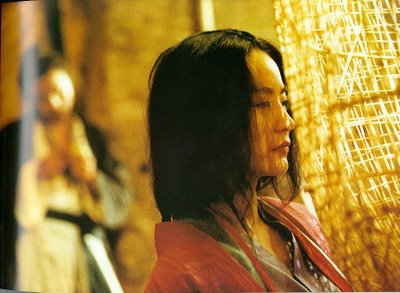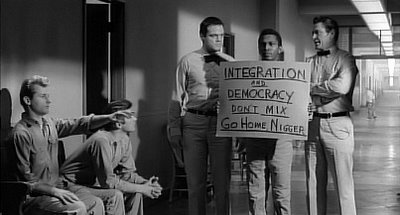
A couple of weeks ago, I sort of participated in the 48 Hour Film Project -- for those of you who don't know what that is, it's a contest in which groups of people have two days to write, shoot, edit, and score a short film of the chosen genre. Each group is selected a different genre (from musical to silent film to spy), and the group whose film I helped on, the Drunken Butterflies, were given "martial arts," which is, in my opinion, one of the more difficult (we had mockumentary last year). After the films screen, awards are given out, and the Drunken Butterflies (not surprisingly) only walked away with the Best Costume (the cinematographer Chris' brother Michael Drummund did an amazing job, so this was expected). I'm not bitching about this, as I wasn't terribly pleased with the film anyway. However, after the films are screened, the judges give "suggestions for next year," in which they stated, "maybe you should tone down the racism, sexism, homophobia, and violence." Um.....

That statement opens a flood of problems with what's wrong with cinema today. Firstly, have these judges ever seen a martial arts film? If they wanted toned down violence, I don't think the genre would exist. In a recreation of a genre picture (which on a broad level is terribly conflicting, but on a smaller, personal level for a filmmaker, a challenging to one's abilities), wouldn't the application of specific genre traits like sexism and racism be necessary? You wouldn't tell someone who was given a task of making a "blaxploitation" film to tone down the racism. Or for melodrama, to tone down the sexism. Secondly, the "suggestions" are simply a testament to our times. Apparently our way of dealing with pre-existing racism, sexism, homophobia is not simply to act like it doesn't exist, but to also soften it and surround it with fluffy pillows and rainbows (non-"homosexual" ones that is). There's a very specific line that should be drawn when regarding film. I'm going to stay away from the movie vs. film comparison and say that perhaps we should distinguish the difference between media and art. Perhaps sexism, homophobia, and racism shouldn't exist in our forms of media (though it still does), but such rules cannot be thrown onto the drawing table in regards to any sort of art form. You can blame
Birth of a Nation for the fashion of the Ku Klux Klan, but you certainly must remember it was probably first successful feature-length narrative in American cinema and a brilliantly composed one at that. We can curse it on idealistic grounds, yet how can we say it's "bad" in regards to "art"? The picture above, from Sam Fuller's
Shock Corridor, shows a black mental patient holding up a sign that would likely offend most "modern" folk out of context. The character went crazy after failing to meet the expectations of his racial brotherhood when he became the first black man to be allowed into a white college. As a defense mechanism, he has become the people who scorned him. If a film dealing with this sort of subject matter were made today (by someone likely less talented than Fuller), we'd be given a warm-hearted story of struggle and eventually overcoming the odds... hopefully starring Morgan Freeman. Instead, when Fuller directly calls upon the problem of racism, he's direct, and he doesn't candycoat this issue. I know you've been waiting for it, so here is opportunity number 867 for me to rip on
Crash. Where
Crash differs is in its blind solving of problems. Even though bad shit happens to our characters (Sandra Bullock falls down the stairs!!!), they all walk away with a powerful lesson about, yep, tolerance and understanding (probably peace and love, too).

Really, isn't one man's sexist another man's feminist? I've been sort of Russ Meyer-wild lately, so here's another opportunity to bring him up. On the DVD for
Beyond the Valley of the Dolls, Roger Ebert briefly discusses Meyer's reputation. On the surface, his films are laced with uncommonly busty ladies. Yet, as Ebert states, in nearly every one of his films, women play the active roles, while men are often just in the background. Women also exert a sexuality, a carnality, that is usually correlated with masculinity. Though perhaps too flip-sided to be considered a successful depiction of feminist theory, it's a helluva lot more progressive than most directors working at the time. Sexism in cinema now exists in the same way racism does. It's still a problem (duh), but we're asked to accept easy answers to a problem that isn't simple.

I must say, the Drunken Butterflies' eight minute martial arts short, entitled
Flute Master IV: Spirit of Doom, wasn't meant to combat, critique, or to perpetuate any of these topics (and, I don't know where the judges got that the film was homophobic in any way). It existed simply as an homage to the genre (a genre that perhaps the judges were not terribly familiar with), a genre whose main components consist of violence and sexism. We all know in the days of
Kill Bill and
Crouching Hero, Hidden Flying Daggers that women have had more active roles in the genre, but this too is a product of our time. Perhaps it's a reflection of the changing times... or perhaps it's an attempt at radicating sexism from the genre (or, if they're feeling really idealistic, society). In any case, thanks for the suggestions for next year, judges. We'll know what to do if we get stuck with the blaxploitation genre!
 A couple of weeks ago, I sort of participated in the 48 Hour Film Project -- for those of you who don't know what that is, it's a contest in which groups of people have two days to write, shoot, edit, and score a short film of the chosen genre. Each group is selected a different genre (from musical to silent film to spy), and the group whose film I helped on, the Drunken Butterflies, were given "martial arts," which is, in my opinion, one of the more difficult (we had mockumentary last year). After the films screen, awards are given out, and the Drunken Butterflies (not surprisingly) only walked away with the Best Costume (the cinematographer Chris' brother Michael Drummund did an amazing job, so this was expected). I'm not bitching about this, as I wasn't terribly pleased with the film anyway. However, after the films are screened, the judges give "suggestions for next year," in which they stated, "maybe you should tone down the racism, sexism, homophobia, and violence." Um.....
A couple of weeks ago, I sort of participated in the 48 Hour Film Project -- for those of you who don't know what that is, it's a contest in which groups of people have two days to write, shoot, edit, and score a short film of the chosen genre. Each group is selected a different genre (from musical to silent film to spy), and the group whose film I helped on, the Drunken Butterflies, were given "martial arts," which is, in my opinion, one of the more difficult (we had mockumentary last year). After the films screen, awards are given out, and the Drunken Butterflies (not surprisingly) only walked away with the Best Costume (the cinematographer Chris' brother Michael Drummund did an amazing job, so this was expected). I'm not bitching about this, as I wasn't terribly pleased with the film anyway. However, after the films are screened, the judges give "suggestions for next year," in which they stated, "maybe you should tone down the racism, sexism, homophobia, and violence." Um..... That statement opens a flood of problems with what's wrong with cinema today. Firstly, have these judges ever seen a martial arts film? If they wanted toned down violence, I don't think the genre would exist. In a recreation of a genre picture (which on a broad level is terribly conflicting, but on a smaller, personal level for a filmmaker, a challenging to one's abilities), wouldn't the application of specific genre traits like sexism and racism be necessary? You wouldn't tell someone who was given a task of making a "blaxploitation" film to tone down the racism. Or for melodrama, to tone down the sexism. Secondly, the "suggestions" are simply a testament to our times. Apparently our way of dealing with pre-existing racism, sexism, homophobia is not simply to act like it doesn't exist, but to also soften it and surround it with fluffy pillows and rainbows (non-"homosexual" ones that is). There's a very specific line that should be drawn when regarding film. I'm going to stay away from the movie vs. film comparison and say that perhaps we should distinguish the difference between media and art. Perhaps sexism, homophobia, and racism shouldn't exist in our forms of media (though it still does), but such rules cannot be thrown onto the drawing table in regards to any sort of art form. You can blame Birth of a Nation for the fashion of the Ku Klux Klan, but you certainly must remember it was probably first successful feature-length narrative in American cinema and a brilliantly composed one at that. We can curse it on idealistic grounds, yet how can we say it's "bad" in regards to "art"? The picture above, from Sam Fuller's Shock Corridor, shows a black mental patient holding up a sign that would likely offend most "modern" folk out of context. The character went crazy after failing to meet the expectations of his racial brotherhood when he became the first black man to be allowed into a white college. As a defense mechanism, he has become the people who scorned him. If a film dealing with this sort of subject matter were made today (by someone likely less talented than Fuller), we'd be given a warm-hearted story of struggle and eventually overcoming the odds... hopefully starring Morgan Freeman. Instead, when Fuller directly calls upon the problem of racism, he's direct, and he doesn't candycoat this issue. I know you've been waiting for it, so here is opportunity number 867 for me to rip on Crash. Where Crash differs is in its blind solving of problems. Even though bad shit happens to our characters (Sandra Bullock falls down the stairs!!!), they all walk away with a powerful lesson about, yep, tolerance and understanding (probably peace and love, too).
That statement opens a flood of problems with what's wrong with cinema today. Firstly, have these judges ever seen a martial arts film? If they wanted toned down violence, I don't think the genre would exist. In a recreation of a genre picture (which on a broad level is terribly conflicting, but on a smaller, personal level for a filmmaker, a challenging to one's abilities), wouldn't the application of specific genre traits like sexism and racism be necessary? You wouldn't tell someone who was given a task of making a "blaxploitation" film to tone down the racism. Or for melodrama, to tone down the sexism. Secondly, the "suggestions" are simply a testament to our times. Apparently our way of dealing with pre-existing racism, sexism, homophobia is not simply to act like it doesn't exist, but to also soften it and surround it with fluffy pillows and rainbows (non-"homosexual" ones that is). There's a very specific line that should be drawn when regarding film. I'm going to stay away from the movie vs. film comparison and say that perhaps we should distinguish the difference between media and art. Perhaps sexism, homophobia, and racism shouldn't exist in our forms of media (though it still does), but such rules cannot be thrown onto the drawing table in regards to any sort of art form. You can blame Birth of a Nation for the fashion of the Ku Klux Klan, but you certainly must remember it was probably first successful feature-length narrative in American cinema and a brilliantly composed one at that. We can curse it on idealistic grounds, yet how can we say it's "bad" in regards to "art"? The picture above, from Sam Fuller's Shock Corridor, shows a black mental patient holding up a sign that would likely offend most "modern" folk out of context. The character went crazy after failing to meet the expectations of his racial brotherhood when he became the first black man to be allowed into a white college. As a defense mechanism, he has become the people who scorned him. If a film dealing with this sort of subject matter were made today (by someone likely less talented than Fuller), we'd be given a warm-hearted story of struggle and eventually overcoming the odds... hopefully starring Morgan Freeman. Instead, when Fuller directly calls upon the problem of racism, he's direct, and he doesn't candycoat this issue. I know you've been waiting for it, so here is opportunity number 867 for me to rip on Crash. Where Crash differs is in its blind solving of problems. Even though bad shit happens to our characters (Sandra Bullock falls down the stairs!!!), they all walk away with a powerful lesson about, yep, tolerance and understanding (probably peace and love, too). Really, isn't one man's sexist another man's feminist? I've been sort of Russ Meyer-wild lately, so here's another opportunity to bring him up. On the DVD for Beyond the Valley of the Dolls, Roger Ebert briefly discusses Meyer's reputation. On the surface, his films are laced with uncommonly busty ladies. Yet, as Ebert states, in nearly every one of his films, women play the active roles, while men are often just in the background. Women also exert a sexuality, a carnality, that is usually correlated with masculinity. Though perhaps too flip-sided to be considered a successful depiction of feminist theory, it's a helluva lot more progressive than most directors working at the time. Sexism in cinema now exists in the same way racism does. It's still a problem (duh), but we're asked to accept easy answers to a problem that isn't simple.
Really, isn't one man's sexist another man's feminist? I've been sort of Russ Meyer-wild lately, so here's another opportunity to bring him up. On the DVD for Beyond the Valley of the Dolls, Roger Ebert briefly discusses Meyer's reputation. On the surface, his films are laced with uncommonly busty ladies. Yet, as Ebert states, in nearly every one of his films, women play the active roles, while men are often just in the background. Women also exert a sexuality, a carnality, that is usually correlated with masculinity. Though perhaps too flip-sided to be considered a successful depiction of feminist theory, it's a helluva lot more progressive than most directors working at the time. Sexism in cinema now exists in the same way racism does. It's still a problem (duh), but we're asked to accept easy answers to a problem that isn't simple. I must say, the Drunken Butterflies' eight minute martial arts short, entitled Flute Master IV: Spirit of Doom, wasn't meant to combat, critique, or to perpetuate any of these topics (and, I don't know where the judges got that the film was homophobic in any way). It existed simply as an homage to the genre (a genre that perhaps the judges were not terribly familiar with), a genre whose main components consist of violence and sexism. We all know in the days of Kill Bill and Crouching Hero, Hidden Flying Daggers that women have had more active roles in the genre, but this too is a product of our time. Perhaps it's a reflection of the changing times... or perhaps it's an attempt at radicating sexism from the genre (or, if they're feeling really idealistic, society). In any case, thanks for the suggestions for next year, judges. We'll know what to do if we get stuck with the blaxploitation genre!
I must say, the Drunken Butterflies' eight minute martial arts short, entitled Flute Master IV: Spirit of Doom, wasn't meant to combat, critique, or to perpetuate any of these topics (and, I don't know where the judges got that the film was homophobic in any way). It existed simply as an homage to the genre (a genre that perhaps the judges were not terribly familiar with), a genre whose main components consist of violence and sexism. We all know in the days of Kill Bill and Crouching Hero, Hidden Flying Daggers that women have had more active roles in the genre, but this too is a product of our time. Perhaps it's a reflection of the changing times... or perhaps it's an attempt at radicating sexism from the genre (or, if they're feeling really idealistic, society). In any case, thanks for the suggestions for next year, judges. We'll know what to do if we get stuck with the blaxploitation genre!
No comments:
Post a Comment